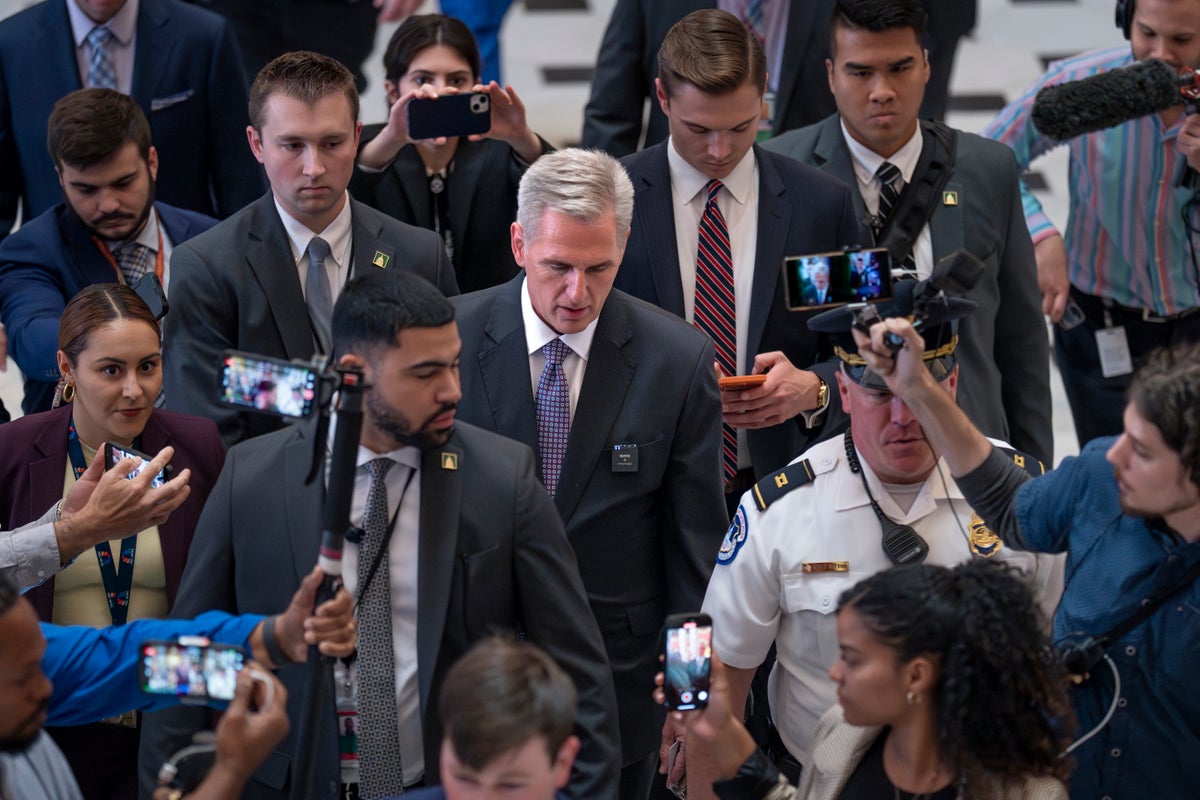
The House of Representatives has voted to raise the debt limit, thereby ensuring the United States will avoid defaulting on its debt, despite vocal opposition from many Republicans in the House majority.
The 314-117 passage of the legislation is the first major hurdle to be cleared for Mr McCarthy, who made a series of concessions on how to negotiate the debt limit during the marathon 15 votes it took for him to become speaker in January.
The Senate will take up the legislation for a vote and Senate Majority Leader Chuck Schumer has pledged it will pass before 5 June, when Treasury Secretary Janet Yellen has warned that the United States will run out of options to maintain its debt obligations.
The legislation had resulted from negotiations between lieutenants of House Speaker Kevin McCarthy and the White House. President Joe Biden praised the agreement and thanked Mr McCarthy and House Minority Leader Hakeem Jeffries.
“This agreement is good news for the American people and the American economy. It protects key priorities and accomplishments from the past two years, including historic investments that are creating good jobs across the country,” he said in a statement.
Mr McCarthy touted the legislation as a victory after Mr Biden and many Democrats had said that they would only support a clean debt limit increase.
“We got all the Democrats who signed a discharge petition to say they would never raise the debt ceiling, only raise it clean,” he said at a news conference afterward. “I got them to vote for it too. So think how much further we can go.”
More Democrats than Republicans voted for the bill, as 165 Democrats voted to raise the debt limit despite spending cuts while only 149 Republicans did.
71 of the 222 Republicans in the House voted against the legislation and 46 Democrats opposed it. Had Democrats not voted for it, the bill would have failed.
Conservative Republicans said that it did not go far enough in its spending cuts and highlighted the fact it raised the debt limit until January 2025, rather than raising it a certain dollar amount.
Rep Ken Buck (R-CO), a conservative dissident, told The Independent that Mr McCarthy went back on his promise to return spending to 2022 appropriations levels, but the debt limit agreement moved spending to 2023 appropriations levels plus an additional one percent spending increase.
“So it's an increase,” he said. But Mr Buck dodged when asked whether he and other conservative hardliners would file a motion to vacate the chair, which would trigger a no-confidence vote in Mr McCarthy.
“I think it's going to be a conversation after this is over,” he told The Independent. “So I think next week conservatives will get together and talk about it.”
But Rep Garret Graves (R-LA), one of the chief negotiators with the White House, said that conservative criticism ignored the fact that had it not been for the agreement, the White House would have likely raised the debt limit unilaterally or Democrats would have teamed up with moderate Republicans to raise the debt limit without spending cuts.
“So by doing so all you're doing is playing into the hands of the White House,” he told The Independent. “Because if you keep going down this road, if you keep trying to sew this line, that's simply not true that there's some other option out there to save a gazillion dollars, all you're doing is you're moving towards default.”
But several House conservatives criticised the bill for multiple provisions, including the fact it did not put in place work requirements for Medicaid.
The agreement increases the age for work requirements for the Supplemental Nutrition Assistance Program (SNAP), formerly known as food stamps, for able-bodied adults without dependent children from 50 to 54. That earned the criticism of many progressive Democrats and led to them opposing the bill.
At the same time, the agreement would exempt youth in the foster care system, veterans and people experiencing homelessness from work requirements for SNAP and the Congressional Budget Office estimated that approximately 78,000 would gain benefits in an average month as a result of the deal.
Rep Byron Donalds (R-FL) criticised the legislation for not going far enough in work requirements such as including them for Medicaid.
“And I think that's just a smart and prudent thing to do,” he told The Independent. “But when you expand eligibility for the program, at least the way CBO is putting it we're actually taking a step backwards.”
But Democrats also had serious criticisms of the legislation, with progressives opposing the approval of the Mountain Valley Pipeline, a natural gas pipeline that spans from West Virginia to Virginia. The pipeline has been a major priority of Sen Joe Manchin (D-WV).
Rep Jamaal Bowman (D-NY) told The Independent he also opposed removing funding from the Internal Revenue Service that passed in the Inflation Reduction Act last year and cuts to discretionary spending.
“And so we need to stand up for them because we don't have a great country without them,” he said. But Mr Bowman pushed back against Mr Graves’s claim that Republicans “schooled” Mr Biden.
“Hell no,” he said. “The President kicked McCarthy's behind. McCarthy’s trying to cut trillions over ten years. The President shut that down. Listen he was a lose-lose situation.”
Rep Maxwell Frost (D-FL), another progressive who voted for the bill, said that progressives could have used their leverage more effectively or Democrats could have raised the debt limit in the last Congress when Democrats controlled the House of Representatives and the Senate.
“I think the President did the best job he could. When people have to start repaying loans or when they see this pipeline approved and damaging our environment - they have to think about Kevin McCarthy,” he told The Independent.







